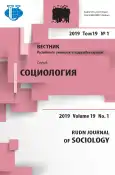Precarious employment: Methodology of measurement
- Authors: Kuchenkova AV1
-
Affiliations:
- Russian State University for Humanities
- Issue: Vol 19, No 1 (2019)
- Pages: 134-143
- Section: Sociological lectures
- URL: https://journal-vniispk.ru/2313-2272/article/view/340348
- DOI: https://doi.org/10.22363/2313-2272-2019-19-1-134-143
- ID: 340348
Cite item
Full Text
Abstract
The article considers approaches to the measurement of precarious employment for numerous studies suggest various ways to estimate its scale based on empirical data. To systematize various methodological solutions, the author identifies three approaches to the measurement of precarization: at the macro-, meso- and micro-level. Each approach is described and illustrated with examples from Russian and foreign scientific literature. The first approach (at the macro-level) studies the prevalence of specific indicators of precarization in dynamics or different social-demographic groups that can be considered precariat. The second approach (at the meso-level) compares different types of non-standard and standard employment in terms of the quality of jobs and working conditions to identify types of employment that can be considered precarious. The third approach (at the micro-level) focuses on the individual employment instability, its subjective perception, lack of employment security, and develops precarization indices. The comparison of indicators within such indices allows to identify common components of precarization: characteristics of wages, social and legal protection, and feeling of insecurity. The article emphasizes features of each approach for the measurement of precarization: the first takes into account not only the employed population but also other categories; the second compares groups representing different types of employment but does not take into account the internal heterogeneity of these groups and considers them as having a high or low level of precarization; this disadvantage is overcome in the third approach that measures precarization at the individual level and takes into account not only types and conditions of work but also voluntary/forced nature of employment.
About the authors
A V Kuchenkova
Russian State University for Humanities
Author for correspondence.
Email: a.kuchenkova@rggu.ru
кандидат социологических наук, доцент кафедры прикладной социологии Российского государственного гуманитарного университета
Miusskaya Pl., 6, Moscow, Russia, 125993References
- Veredyuk O.V. Neustoychivost zanyatosti: teoreticheskie osnovy i otsenka masshtabov v Rossii [Instability of employment: Theoretical concept and estimates of its scale in Russia]. Vestnik SPbGU. Seriya 5. 2013; 1: 25—32 (In Russ.).
- Golenkova Z.T., Goliusova Yu.V. Novye sotsialnye gruppy v sovremennykh stratifikatsionnykh sistemakh globalnogo obshchestva [New social groups in contemporary stratification systems of global society]. Sotsiologicheskaya Nauka i Sotsialnaya Praktika. 2013; 3: 5—15 (In Russ.).
- Kolot A.M. Transformatsiya instituta zanyatosti kak sostavlyayuschaya globalnykh izmeneniy v sotsialno-trudovoy sfere: fenomen prekarizatsii [Transformation of the institution of employment as a part of global changes in the social-labor sphere: The phenomenon of precarization]. Uroven Zhizni Naseleniya Regionov Rossii. 2013; 11: 93—101 (In Russ.).
- Kuchenkova A.V., Kolosova E.A. Differentsiatsiya rabotnikov po kharakteru neustoychivosti ikh zanyatosti [Differentiation of workers by features of precarious employment]. Monitoring Obshchestvennogo Mneniya: Ekonomicheskie i Sotsialnye Peremeny. 2018; 3; 288—305 (In Russ.).
- Maslova E.V. K voprosu o metodike vyyavleniya sloya prekariev na osnove analiza standartnoy i nestandartnoy form zanyatosti [On the technique of revealing a stratum of precarias by the analysis of standard and non-standard types of employment]. Vestnik VIVT. 2017; 2: 175—182 (In Russ.).
- Toshchenko Zh.T. Prekariat — novy sotsialny klass [Precariat — a new social class]. Sotsiologicheskie Issledovaniya. 2015; 6: 3—13 (In Russ.).
- Toshchenko Zh.T. Prekariat: ot protoklassa k novomu klassu [Precariat: From the Protoclass to a New Class]. Moscow: Nauka; 2018 (In Russ.).
- Fedorova A.E., Parsyukevich A.M. Prekarizatsiya zanyatosti i ee vliyanie na sotsialno-ekonomicheskoe blagopoluchie naemnykh rabotnikov [Precarization of employment and its impact on the social-economic well-being of employees]. Izvestiya UrGEU. 2013; 5: 76—81 (In Russ.).
- Shkaratan O.I., Karacharovsky V.V., Gasyukova E.N. Prekariat: teoriya i empirichesky analiz (na materialakh oprosov v Rossii, 1994—2013) [Precariat: Theory and empirical analysis (based on the data of opinion polls in Russia in 1994—2013)]. Sotsiologicheskie Issledovaniya. 2015; 12: 99—110 (In Russ.).
- Brady D., Biegert Th. The Rise of Precarious Employment in Germany. SOEP Papers on Multidisciplinary Panel Data Research. 2017: 936.
- Cranford C.J., Vosko L.F., Zukewich N. Precarious employment in the Canadian labor market: A statistical portrait. Just Labor. 2013: 3: 6—22.
- It’ s more than poverty: Employment precarity and household well-being. Poverty and Employment Precarity in Southern Ontario. Ed. by S. McBeth. https://labourstudies.mcmaster.ca/ pepso/documents/2013_itsmorethanpoverty_report.pdf.
- Kalleberg A.L. Precarious work, insecure workers: Employment relations in transition. American Sociological Review. 2009: 74: 1—22.
- Precarious Employment and Working Conditions in Europe. Ed. by V. Letourneux. Luxembourg: Office for Official Publications of the European Communities; 1998.
- Tangian A. Is flexible work precarious? A study based on the 4th European survey of working conditions 2005. WSI — Diskussionspapier. 2007: 153.
- Vives A., Gonzáleza F., Moncadae S., Llorense C., Benach J. Measuring precarious employment in times of crisis: The revised Employment Precariousness Scale (EPRES) in Spain. Gaceta Sanitaria. 2015; 29: 379—382.
- Vives A., Vanroelen Ch., Amable M., Ferrer M., Moncada S., Llorens C., Muntaner C., Benavides F.G., Benach J. Employment precariousness in Spain: Prevalence, social distribution, and population-attributable risk percent of poor mental health. International Journal of Health Services. 2011; 41 (4): 625—646.
Supplementary files









